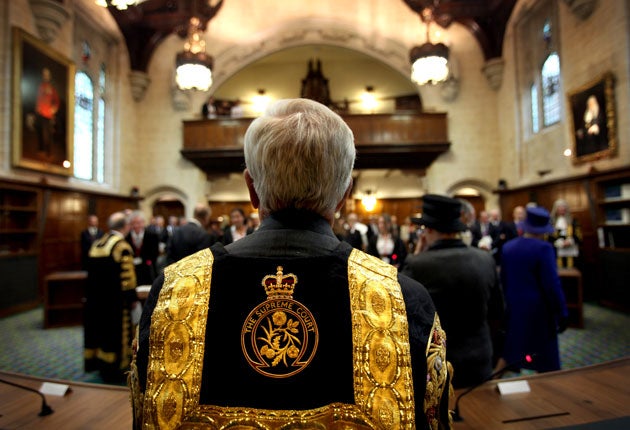Ruling on expert witnesses worries child-abuse lawyers

Your support helps us to tell the story
From reproductive rights to climate change to Big Tech, The Independent is on the ground when the story is developing. Whether it's investigating the financials of Elon Musk's pro-Trump PAC or producing our latest documentary, 'The A Word', which shines a light on the American women fighting for reproductive rights, we know how important it is to parse out the facts from the messaging.
At such a critical moment in US history, we need reporters on the ground. Your donation allows us to keep sending journalists to speak to both sides of the story.
The Independent is trusted by Americans across the entire political spectrum. And unlike many other quality news outlets, we choose not to lock Americans out of our reporting and analysis with paywalls. We believe quality journalism should be available to everyone, paid for by those who can afford it.
Your support makes all the difference.Vital expert witnesses may be too afraid to testify because of the "chilling effect" of a Supreme Court ruling that leaves them open to being sued, lawyers warned yesterday.
The ruling last week removed immunity for expert witnesses, reversing more than 300 years of legal protection. Lawyers predict the change will prompt many lawsuits against experts.
The court ruled that expert witnesses had a "duty of care" to their clients in the same way as any other professional. However, Justice Lady Hale, who was one of two Supreme Court judges to vote against the ruling, said its likely impact was so worrying – she called it "chilling" – that Parliament should examine the issue.
Expert witnesses provide important evidence in thousands of cases every year, ranging from child abuse to medical negligence. It is feared that justice could be impaired if they are afraid to work and their numbers decline. Fewer experts would limit the numbers of cases that could be heard. Lawyers warn that child abuse cases, where expert testimony is already in short supply, is a particular worry.
James Badenoch QC, chairman of the Expert Witness Institute, said: "The worry is that expert witnesses will be frightened off by their concerns about being sued. Child protection cases give rise to the greatest concern. Children being maltreated crucially depend on doctors being willing to stand up and give evidence, and this will be another disincentive for those people to be willing to lend their learning."
Peter Garsden, president of the Association of Child Abuse Lawyers, said: "This could be horrifying. I'm in charge of vetting expert witnesses for my firm, and it's already really difficult to find them. Child abuse cases are an area where the expert should feel unfettered by the fear of legal consequences in giving their opinion. If the fear of litigation means they refuse to participate in medico-legal work, it will have a drastic effect on what we do because, in our line of work, the expert opinion is pivotal."
The Supreme Court ruling involved a motorcyclist, Paul Wynne Jones, injured by a car. His expert, the clinical psychologist Sue Kaney, changed her mind about whether he had suffered post-traumatic stress. As a result, the victim said, he was awarded less compensation and so he sued.
Daniel Shapiro, a barrister who acted for Mr Wynne Jones, said: "I would be very surprised if we don't see between five and ten cases commenced in the next year against experts. Most people have experienced losing cases as a result of an expert witness... Hopefully, the risk of liability means experts will focus more on their duty to the court at the outset."
Professor Penny Cooper, associate dean at City University Law School, said the ruling might also mean other witnesses were now more likely to be sued. "Worryingly, the Supreme Court failed to make it clear just who is covered by this ruling: for instance, could it include some professional witnesses, too? Lady Hale thinks it could and I agree. This lack of clarity now opens up the possibility of legal action against all sorts of witnesses. The witness box, when the witness is most alone and most under pressure from the cross-examiner who is trying to get them to change their opinion, becomes an even more scary place to be."
Join our commenting forum
Join thought-provoking conversations, follow other Independent readers and see their replies
Comments